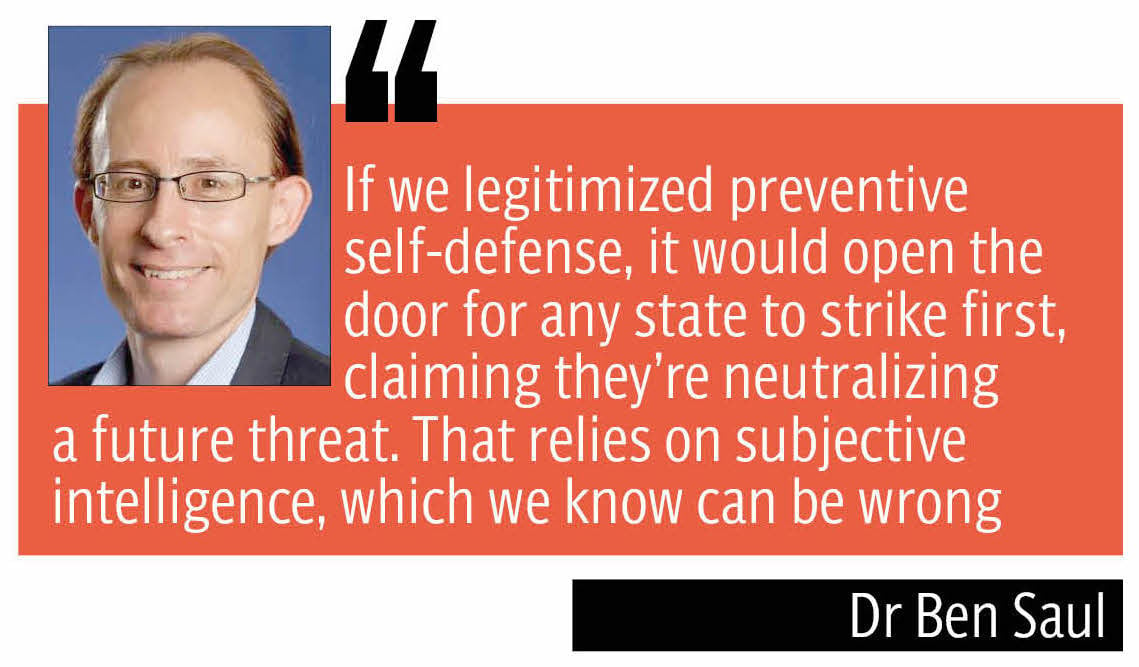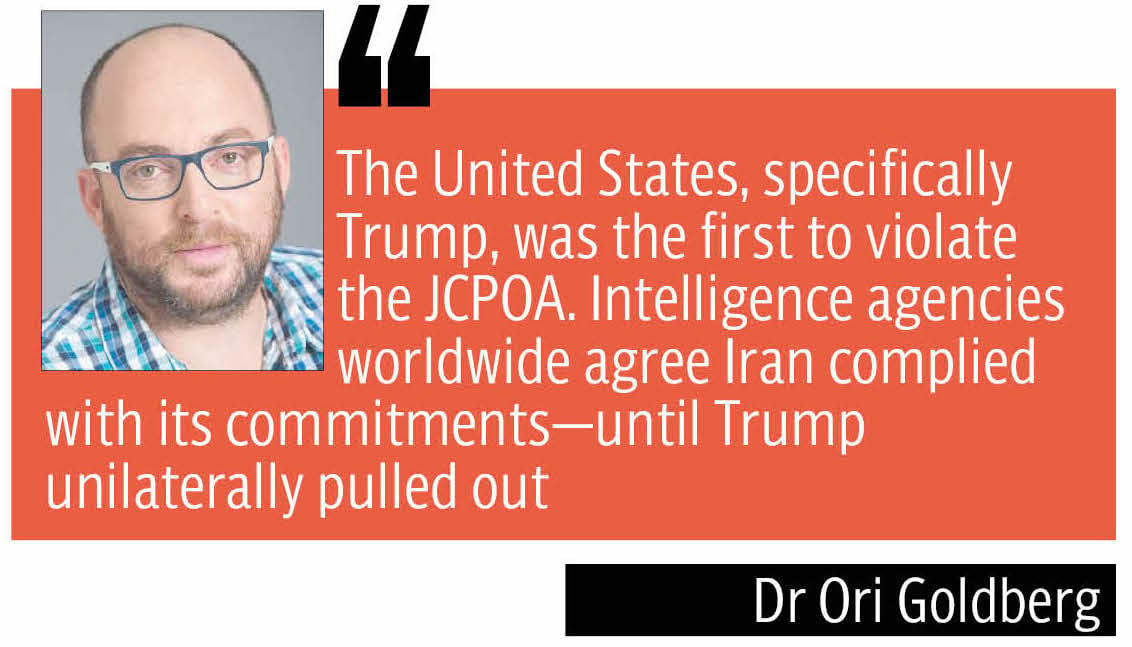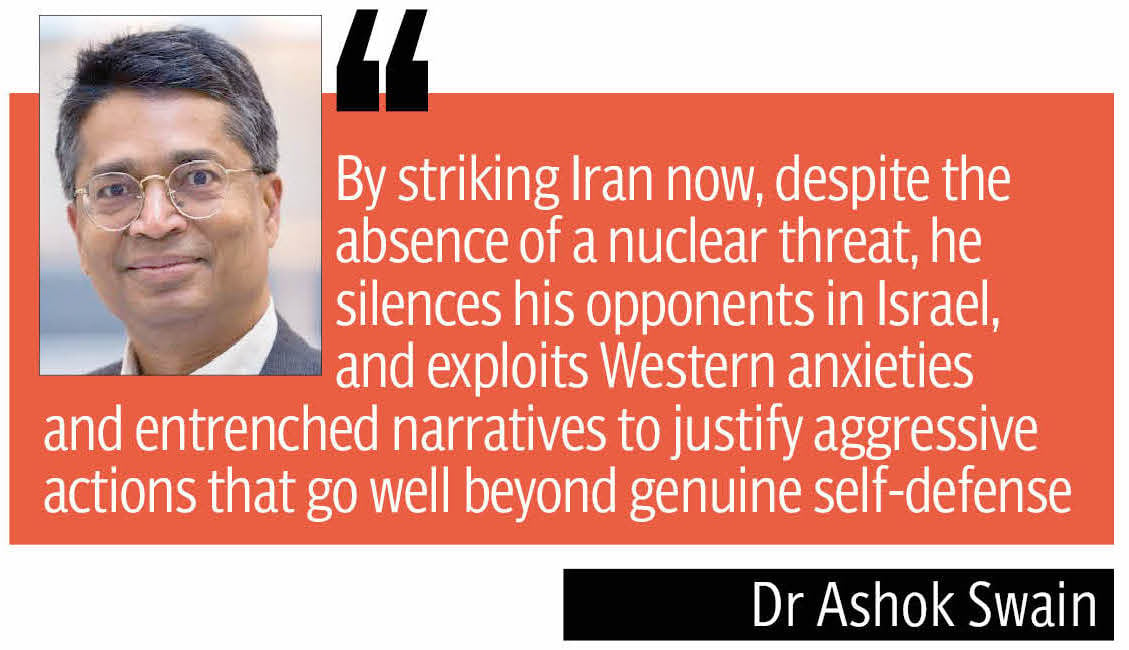
Once again, the world is watching a conflict unfold beneath the shadow of an eerily familiar warning.
In 2003, the United States invaded Iraq on the unproven claim that Saddam Hussein possessed a stockpile of weapons — including some allegedly capable of mass destruction. The inspection process was cut short. Intelligence — later debunked — was presented to mislead the United Nations. What followed was a war that shattered Iraq, leaving its cities gutted and its people abandoned in the wreckage of a conflict built on deception.
Two decades later, the script feels hauntingly familiar. The stage, this time, is Iran.
With Gaza reduced to rubble and more than 55,000 Palestinians killed by Israeli bombardment, Prime Minister Benjamin Netanyahu has seized the moment to pursue a long-standing ambition — open confrontation with Iran, Israel’s regional and ideological nemesis. The justification — once again — is framed as preemption — an effort, he claims, to dismantle Tehran’s nuclear ambitions before they can materialise.
But if history is repeating itself, it is doing so with chilling acceleration — bypassing debate, diplomacy, and even the veneer of deliberation. Just the strike. This was no impulsive act born of ideology alone. Israel’s attack on Iran was
calculated — timed to shift the narrative just as international outrage over its Gaza campaign reached fever pitch. Tehran, meanwhile, still clung to the illusion that diplomacy might yet succeed, despite the nuclear deal’s collapse following Donald Trump’s unilateral withdrawal from the Obama-brokered accord. Netanyahu’s action has effectively brought the region to the edge of a broader war, and its reverberations could echo for years. The strike undermines the foundations of the international rules-based order, eroding what little faith remains in the global norms designed to check unilateral aggression. Once again, international law appears to flex around Israel — carving out a dangerous exception.
Experts warn that the implications of Israel’s attack could echo far beyond the Middle East. If allowed to stand, the strike risks encouraging other states to abandon diplomacy, forsake negotiation, and adopt a similar playbook — one
that recasts preemptive assault as legitimate security policy. The outcome, some argue, could make the vision of nuclear non-proliferation a fantasy in an increasingly polarised world.
“Israel’s attack on Iran is unprovoked and a violation of the prohibition on the use of force under the UN Charter and customary international law,” said Dr Ben Saul, Challis Professor of International Law at the University of Sydney.
Dr Ashok Swain, professor of peace and conflict research at Uppsala University in Sweden, shared that concern. The strike, he said, came despite assessments from global intelligence agencies and the UN indicating no imminent nuclear threat — an act that not only invalidates the strike’s rationale but weakens the credibility of diplomacy itself.
“For states that might have otherwise trusted negotiation frameworks,” Swain said, “this sends a clear message: that even compliance and transparency may not shield them from military action by powerful states or their allies.”
On the other hand, the risk, he warned, is that such actions could incentivise covert nuclear development, as states conclude that an actual deterrent may provide greater protection than international assurances ever could. The strike, then, chips away at an already fragile global non-proliferation regime and could inflame arms races in unstable regions.

Erosion of international law
A week ago, the Middle East became more volatile, and the world woke up to it in absolute shock. Israel had launched strikes on what it claimed were Iranian nuclear facilities, citing self-defence. Diplomatic statements poured out from Western capitals — some cautiously worded, others subtly endorsing the act. Yet for legal scholars like Dr Saul from the University of Sydney — this was not just another turn in a turbulent regional rivalry. It was a rupture in the international legal order.
While Israel has not disclosed operational details, satellite imagery indicates a strike on Iranian infrastructure possibly linked to its nuclear programme. Tel Aviv framed the attack as a preemptive necessity. Some Western leaders even called it “legitimate” self-defence. But Saul is unequivocal — international law does not permit such reasoning.
“You can only use force in self-defence if an armed attack is already happening or imminent,” he explained. “Preventive or anticipatory self-defence — against a speculative future threat — has been rejected for decades.”
The principle was tested in 2003, when the US invaded Iraq citing Saddam Hussein’s supposed WMD arsenal. Then, as now, much of the international community dismissed the legal basis. The difference today, Saul argues, is that erosion of the legal norm now feels more permanent.
What’s deeply troubling, he said, is the way Western democracies are beginning to entertain these justifications. Germany, France, Australia, the US — some of these nations are now quietly legitimising a legal stance they’d never accept from adversaries.
From the bombing of Iraq’s Osirak reactor in 1981 to Syria in 2007, Israel’s preemptive attacks have long been a feature of its security doctrine. But the stakes are now far higher — not just because Iran is the target, but because the assault comes amid broader regional instability — a ferocious war in Gaza, surging settler violence in the West Bank, and an increasingly extremist Israeli government.
“Israel is behaving as if it’s above the law,” Saul said. “Public opinion has also moved. There’s growing support inside Israel for more aggressive actions. And without meaningful accountability from the West, there’s no restraint.”
In this vacuum, Israel has expanded settlements, strangled Gaza, and carried out repeated strikes in Syria, Lebanon — and now Iran. US pressure, once the only serious check on Israeli escalation, has faded into symbolic measures: a delayed arms shipment here, a token sanction there.
“We didn’t see this permissiveness when Russia invaded Ukraine,” Saul said. “Or during apartheid South Africa. The West’s leniency with Israel is extraordinary. It’s about geopolitical interests, not principle.”
These legal precedents are not academic footnotes — they are the scaffolding of a global order painstakingly assembled after the horrors of fascism and empire. If the foundational idea — that might does not make right — crumbles, so too do the protections smaller nations rely on.
“Before 1945, the world was ruled by conquest and colonisation,” Saul warned. “Without legal limits, powerful states will act with impunity. That leads to conflict, instability, and weapons proliferation.” Israel’s own undeclared nuclear arsenal — estimated at around 90 warheads —only amplifies the danger. Saul notes that this secret, open to all, has long nudged states like Iran toward seeking their own deterrent.
Paradoxically, Israel’s overwhelming advantage makes the notion of an Iranian first strike implausible. “Iran’s leadership isn’t suicidal,” he said. “If they ever acquire a weapon — and that’s still hypothetical — they know it would trigger annihilation. Between Israel’s nuclear stockpile and America’s backing, it’s absurd to think Tehran would launch an attack.”
Even Western intelligence doesn’t support Israel’s alarmism. US assessments have repeatedly found that Iran has not made the political decision to build a bomb. Israeli claims say otherwise. But the legal bar for anticipatory self-defence is far higher than mere suspicion — it requires proof of imminent danger.
“Israel’s claim doesn’t meet that threshold,” Saul said. “There’s no active attack. No imminent threat. No intention to deploy a weapon. This isn’t self-defence. It’s aggression.”
Observers see strategic timing in the strike. With Netanyahu’s popularity nosediving over Gaza and Trump’s potential return boosting the Israeli far right, the Iran assault could serve domestic and regional aims alike. Saul recognised the pattern.
“Israel seized the moment,” he said. “Iran is weakened — by sanctions, unrest, and proxy setbacks.”
“This is bigger than Israel and Iran,” Saul warned. “If bombing based on speculation is legitimised, the global legal order is already fracturing.”

View from Israel
As Israeli jets roared across Iranian skies, Dr Ori Goldberg cautioned that the operation was less about deterrence than impunity. “Israel doesn’t want regional war,” he said. “It wants impunity.”
A scholar of Middle Eastern studies with a focus on Iran, Goldberg is no distant observer. He is Israeli, Jewish, and deeply rooted in the state whose actions he now critiques. His words cut through diplomatic hedging with sharp precision.
What Israel wants, Goldberg said, is full discretion to strike wherever, whenever, and whomever it chooses — and to pay no price.
The official rationale for the strike — an alleged acceleration in Iran’s nuclear programme — doesn’t convince Goldberg. “Even the IAEA didn’t suggest anything urgent,” he said. “Netanyahu himself said this was about intentions, not capabilities.”
He sees the strike as a political deflection — away from Gaza, where Netanyahu’s strategy has stalled. “This wasn’t about Iran. It was about Gaza,” Goldberg said. “Israel had no more cards to play in Gaza — only more blood. It needed to shift the world’s gaze.”
This, he believes, is Netanyahu’s calculation: to recast Israel, mired in a catastrophic campaign, as a global sentinel against Iranian menace. “Forget the bodies in Gaza, the message says. Now we’re fighting the righteous fight. Back us — or back the mullahs.”

The pattern
What the world witnessed, according to Swain of Uppsala University, follows a time-worn script.
“Netanyahu’s doctrine of preemptive strikes — widely echoed in the West as self-defence — has long been about political opportunism,” Swain said. “For over thirty years, he’s warned that Iran is on the verge of building a bomb. Yet Israeli and international intelligence have consistently contradicted that.”
This narrative, Swain argues, is instrumentalised — to consolidate power, attract global backing, and deflect attention from occupation and domestic upheaval. “By striking Iran now, in the absence of any nuclear threat Netanyahu silences critics, taps into Western anxieties, and frames aggression as defence.” Goldberg finds the legal defence of “preventive self-defence” especially pernicious.
“There’s no ‘they-deserved-it’ clause in international law,” he said. “This isn’t defence. It’s a doctrine of moral supremacy.”
He described the Israeli worldview as underpinned by a simple binary: “We are good, Iran is bad — because we are good and Iran is bad.” Such logic, he said, strips away nuance and sanctifies unilateral violence. Goldberg is particularly scathing of Netanyahu’s reliance on religious metaphors. “Holocaust imagery. Moses. Divine destiny. It’s grotesque,” he said. “As a Jew, I’m ashamed.” The nuclear issue, he insists, is a smokescreen. “This isn’t about centrifuges,” he said. “It’s about proving Israel can act with impunity.”
A nuclear Iran
According to Goldberg — and backed by recent US assessments, despite Trump’s denials — Iran is far from building a bomb. Iran’s compliance with the 2015 nuclear deal was repeatedly verified until the US abandoned it.
“Iran kept its word,” Goldberg noted. “Trump broke the deal. Now Israel pretends Iran is the destabiliser?” Without exonerating Tehran, he said: “If Iran chooses to go nuclear, it’ll be a political decision — and a dangerous one. But it’s a response to sanctions, assassinations, sabotage — not a spontaneous escalation.”
Adding to Goldberg’s assessment, Swain said: “The strike sends a chilling message — compliance offers no safety. That may lead to covert proliferation.” Goldberg believes Israel’s strategy misjudges Iran’s domestic dynamics.
“Iranians who once opposed the hardliners now rally behind them,” he said. “Even those critical of the regime are patriotic. Under attack, they unite.”
The Israeli support system
Despite assumptions of enduring alliances, Goldberg sees Israel increasingly isolated. “It stands more alone today than at any point in recent memory,” he said. “Even Saudi Arabia and the UAE condemned the strike.”
He takes those condemnations seriously. “They’re not posturing. They’re afraid. Israel has shown it can strike without warning — even at its partners. That terrifies them.”
Taking aim at the West’s enabling role, Swain remarked: “They’ve provided military aid, diplomatic cover, arms transfers, and rhetorical support. This isn’t mere complicity — it’s active facilitation.”
Referring to German leader Friedrich Merz’s claim that Israel is doing the West’s dirty work, he added: “That’s a tacit admission of outsourced coercion. It entrenches cycles of violence, erodes Western credibility, and deepens
resentment across the Global South.”
The Trump variable
Goldberg is under no illusions about Washington’s centrality. The US is both a supplier and potential restraint. As for Trump, Goldberg is sceptical: “He’s no peacemaker. He’s chaotic, narcissistic. But he hasn’t jumped in yet. That’s
deliberate.”
The US president, according to Goldberg, is calculating. “If escalation benefits him, he’ll escalate. If not, he’ll stay silent.” But time, Goldberg said, isn’t on Netanyahu’s side. “The longer the US keeps out, the harder it’ll be to draw it in.”






